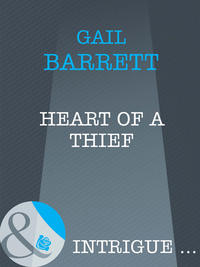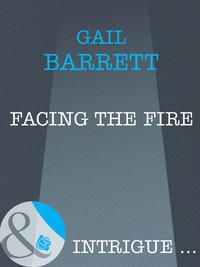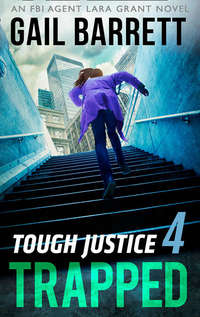
Полная версия
Seduced by His Target

Secrets, passion and revenge fuel this thrilling new installment of award-winning author Gail Barrett’s BURIED SECRETS series!
For victims of violence, Nadine Seymour—formerly Nadira al Kahtani—is a savior in surgeon’s clothing. But this time it’s Nadira who must be saved…from her own corrupt family. Rasheed Davar—a rebellious CIA agent seeking to avenge his wife’s murder—could risk his undercover mission to save her. But will he?
As a dangerous plot heats up in the nation’s capital, Rasheed can’t deny the mounting tension—or his desperate need to tamp down his attraction. Nadira is beautiful. She is brave. And she’s just the kind of high-stakes hostage who could awaken his own battered heart—and lure them both into the terrorists’ crosshairs….
“Men like you are selfish,” she continued, her voice trembling.
“You think your stupid beliefs give you the right to take whatever you want. But you’re wrong. What you believe is wrong. And you’re not going to win.”
Her chest heaved. Her eyes stung, but she blinked back the tears, refusing to give him the satisfaction of seeing her cry. She would not show any weakness around this man.
His eyes turned even blacker. He closed the distance between them, but she held her ground, refusing to budge. “Stay in the hut, Nadira. Don’t try to escape.”
“Or what?” she taunted. “You’ll kill me?” She let out a high-pitched laugh.
His big hands gripped her shoulders. He gave her a shake, fueling her temper even more.
But then his mouth was on hers. She froze, utterly shocked, the feel of him slaying her senses—his warm, hard lips, the scrape of his sandpapered jaw, the strength in his massive hands. A thought bubbled up, that she needed to resist this, but it vanished like smoke in the wind.
Buried Secrets: Three murder witnesses, one deadly conspiracy.
Dear Reader,
When most people think of cosmetic surgery, they think of facelifts and fillers, implants or liposuction—procedures designed to enhance a person’s beauty and youth. But there is another side to plastic surgery, the healing side, restoring features disfigured by accidents, violence or disease.
The heroine of Seduced by His Target, Nadine Seymour, is just such a plastic surgeon. She specializes in reconstructive work on battered women. Coming from an abusive background, Nadine understands the value corrective surgery can have, not just in making these victimized women beautiful again, but in helping repair their broken lives.
But Nadine has wounds of her own, deep ones she has avoided for fifteen years. Now, when her past finally catches up to her, she must stand her ground and confront her enemies, including a lethal warrior who is everything she most fears...and desires.
This is the last installment of the Buried Secrets trilogy. It has been quite an adventure watching these three courageous runaways confront their pasts, face down their biggest fears and earn the happy endings they deserve. I hope you’ve enjoyed their stories as much as I have.
Happy reading!
Gail Barrett
Seduced by His Target
Gail Barrett

Gail Barrett
always knew she’d be a writer. Who else would spend her childhood grinding sparkling rocks into fairy dust and convincing her friends it was real? Or daydream her way through elementary school, spend high school reading philosophy and playing the bagpipes, then head off to Spain during college to live the writer’s life? After four years, she straggled back home—broke, but fluent in Spanish. She became a teacher, earned a master’s degree in linguistics, married a coast-guard officer and had two sons.
But she never lost the desire to write. Then one day she discovered a Silhouette Intimate Moments novel in a bookstore—and knew she was destined to write romance. Her books have won numerous awards, including a National Readers’ Choice Award and Romance Writers of America’s prestigious Golden Heart Award.
Gail currently lives in western Maryland. Readers can contact her through her website, www.gailbarrett.com.
I’d like to thank my brother, Ken Archer, for helping me with the financial details of this story, and my critique partner, Karen Anders, for her expertise and support. Thank you both!
To John, one of the good guys.
Contents
Chapter 1
Chapter 2
Chapter 3
Chapter 4
Chapter 5
Chapter 6
Chapter 7
Chapter 8
Chapter 9
Chapter 10
Chapter 11
Chapter 12
Chapter 13
Chapter 14
Chapter 15
Chapter 16
Epilogue
Excerpt
Chapter 1
It was the perfect day for a kidnapping.
Steel-gray clouds hovered over the mountains, obscuring their escape route. Thunder rumbled in the distance, promising to mask any cries for help. The local farmers, exhausted after a brutal day spent toiling in the Peruvian highlands, had taken shelter in their drab mud huts, oblivious to the terrorists preparing to pounce.
Gazing through his binoculars, Rasheed Davar lay flat on his belly in a tuft of chiliwua grass, studying the American medical team milling around their camp below. “Which one is the target?”
The terrorist beside him lowered his binoculars, his silver tooth gleaming in the dwindling light. “She’s not here yet.”
She? Rasheed shifted, a sliver of uneasiness stirring inside him, but he clamped down hard on the doubt. He couldn’t react, couldn’t show any hesitation or concern. Too many lives depended on this mission’s success—including his.
Schooling his expression into indifference, he thumbed the focus on his binoculars and continued to survey the camp. A young blond woman fed kindling into the campfire. A gray-haired man sat beside her, stirring something in a metal pot. Both wore scrubs, typical attire for the volunteer medical teams that traveled through the remote villages in the Andes Mountains doing humanitarian work. Another woman, a brunette in a bulky parka, knelt on a tarp laden with pharmaceutical supplies, sorting and packing them into various bags. On the periphery of the camp, beyond a cluster of dome-shaped tents, a brown-skinned man, his chullo hat and poncho marking him as a Peruvian native, tended the tethered mules.
“So what’s the plan?” Rasheed asked.
The terrorist looked at him again. Known only as Amir, he had cold, flat eyes as black as death, and promising as much. Rasheed had met hundreds of men like him during the years he’d lived in the mountains of Jaziirastan, working his way through the training camps. Ruthless. Callous. Inured to all human feelings except one—sheer, unbridled hate. Men who would kill in a heartbeat, whose goal was the annihilation of anyone who didn’t submit to their way of life. Zealots who destroyed innocents with utter disinterest, murdering women and children with no remorse.
Like Rasheed’s pregnant wife.
“We’ll wait for the woman to show up,” Amir told him in his native Jaziirastani. “As soon as we identify her tent, we’ll rejoin Manzoor. We’ll move in tonight when the rain hits. Manzoor and I’ll stand guard. You’ll grab the woman. Just make sure you get the right one.”
“I’ll get her,” he promised. He had no choice. He had to play his part.
But why did they want a prisoner? This crack terror cell, the Rising Light’s most elite contingent, had come to Peru for one reason only—to join up with the South American drug cartel that would ferry them into the United States. Or so Rasheed had thought. This surprise detour to capture an American doctor didn’t make sense.
But he didn’t dare question their plans. Neither Amir nor Manzoor, their small cell’s leader, trusted him completely, even though he’d been careful not to cause any doubt. He’d paid his dues. He’d spent years proving his loyalty as he rose through the Rising Light’s ranks. And thanks to his Jaziirastani parents—and the CIA’s most talented forgers—he had the linguistic skills and documents to pass as a native of that land. Whether the terrorists suspected him of being a traitor or were withholding information out of their usual paranoia, Rasheed didn’t know. But he needed to show them the blind obedience they expected to keep from tipping them off.
“We’ll exit that way,” Amir continued, pointing toward a slot between the hills. “We’ll need to move fast. God willing, we’ll have success.”
Rasheed gave the expected response. But his idea of success didn’t match Amir’s. He’d only celebrate when he’d thwarted the upcoming attack and brought down the terrorists’ kingpin, the financier who’d murdered his wife.
Thunder drummed across the steep terrain. The wind bore down, sweeping through the wheat-colored clumps of grass, bringing with it the threat of rain. Then a movement on the trail below them caught his attention, and he aimed his binoculars that way, careful to keep the lens from reflecting the waning light. Two people, a man and a woman, came into view, both carting backpacks, both wearing jackets over their surgical scrubs.
Rasheed’s pulse began to speed up.
The man led the way. He was tall, thin, probably in his mid-thirties, with a long, narrow face and a large hooked nose. He had a short, scraggly beard, and blisters on his nose and ears, thanks to the scorching, high-altitude sun.
The woman walked beside him, her head bent, her face hidden beneath her wide-brimmed hat. Rasheed stayed stone-still, keeping his binoculars trained on her as she hiked along. Then suddenly, she raised her head and glanced around, as if sensing his scrutiny, and he finally caught a glimpse of her face.
His breath made a hitch. His heart stumbled through several beats. “That’s the target?” he blurted out, unable to conceal his disbelief.
“That’s her.”
She was beautiful. Strikingly so with high, sculpted cheekbones, delicately winged black brows and a full, lush mouth in her tawny face. Her skin was satin smooth, her lips a tempting pink. She wore her long black hair in a single braid, but the wind had worked the shorter strands loose, sending them dancing around her face. She moved with an athletic grace, hinting at a slender build beneath her coat. But it was her remarkable face that held him spellbound, making it damned near impossible to breathe.
Then she turned her head, staring straight into the binoculars, and everything inside him stilled. Her eyes were green, the cool, silvery-green of desert sagebrush or ancient olive trees. The pale color was unexpected, captivating, provoking something instinctive inside him—the primitive male urge to possess.
His ancestors would have raided for her, started wars over her, killed for her. She had the rare kind of beauty coveted by sheikhs and kings.
“Who is she?” he asked, aware he was taking a risk. Questions aroused suspicions. And he’d worked too hard to infiltrate this terror cell to blow his cover now.
But this woman...
“She looks Middle Eastern,” he added as an excuse.
Amir grunted. “She’s Jaziirastani.”
Jaziirastani? Why were they kidnapping a woman from their own country? His curiosity mounted, but Rasheed knew better than to ask. He had to bide his time, displaying the blind compliance the terrorists expected while somehow ferreting out their plans.
The target hiked across the clearing toward the tents, her movements graceful despite her pack. She dropped off the unwieldy backpack with the woman organizing the supplies and lingered for a moment to chat. He studied the tilt of her head, the elegant way she moved her hands, still wondering who she could be. Then she continued to a large, gray-and-blue tent beneath a tree. She disappeared inside, emerging a few minutes later wearing jeans instead of scrubs, and started back across the camp toward the fire.
Amir caught his eye. His checkered kaffiyeh headscarf flapped in the wind. “We have the information we need. She’s in the farthest tent. Let’s go.” He started scooting backward through the grass.
Rasheed hesitated, shooting the medical group another look as they went about their tasks, heedless of the raid that was about to shatter their night. If only he could warn them. They’d come here with noble intentions, doing their part to mitigate the misery of the impoverished farmers’ lives. And they didn’t deserve the fear they were about to suffer during the attack.
But he couldn’t risk it. He couldn’t do anything to blow his cover now, not when this mission’s success lay squarely in his hands. Because whatever these terrorists had planned, whatever the reason they’d hired a drug cartel to smuggle them into the United States, this thing was huge, rumored to rival 9/11 in scope. And it was up to him to discover their plot and stop them, no matter what it took.
The sky grew dim. Thunder grumbled again, rolling up the valley and reverberating against the terraced hills. The medical team members halted their activities and looked up. The clouds were drawing closer, their tombstone-colored bottoms growing more ominous as they dragged rain across the jagged peaks. The mules picketed beside the tents began to stir.
Aware of Amir’s impatience, Rasheed spared the Jaziirastani woman a final glance. No, he couldn’t warn them. He couldn’t risk interfering in the attack. All he could do was try to protect them the best he could while keeping his goal in sight.
* * *
If there was one thing Nadine Seymour would never understand, it was man’s propensity for violence. No matter where she’d traveled or worked—whether in glitzy New York City, in her father’s native land of Jaziirastan, or here, in the isolated mountain villages of Peru where thatch-roofed huts clung precariously to the craggy hillsides—she’d come across the same defeated women, their bodies battered and bruised, their eyes filled with hopelessness and despair.
She would never understand it. Never accept it. And she sure as hell would never put herself in a position to experience it firsthand.
“So how did it go today?”
Her lower back aching, her head throbbing from the scarcity of oxygen at fourteen thousand feet, she lowered herself beside the campfire and warmed her hands. She glanced at Henry, taking in his kind blue eyes, his sparse gray hair sticking up in disarray, the white whiskers emerging on his jaw. A retired general practitioner in his late sixties, he’d helped organize this trek along the ancient Inca trade routes to the tiny hamlets scattered throughout the peaks—places where there was no electricity, no running water, no medical service or phones. Just unrelenting misery and abuse.
“The same as always,” she said, releasing a sigh. “Parasites, basal cells, some battered women and kids.”
“Did many people show up?”
“Yeah, we missed you.” Their small team—two doctors, two nurses, a pharmacist and an interpreter who doubled as their cook, mule tender and guide—had been traveling in the Andes with Medical Help International, a private charitable organization, for over a month now, in areas so remote some villagers had never seen foreigners before. But despite the isolation, word of their impending arrival had spread, and people had straggled into their makeshift clinic all day, standing patiently in line for hours, and paying with whatever they could—food, blankets, coins, even an occasional chicken or bird. Twelve hours later, the last few patients had finally left, their prescription drugs tucked into their unkuña carrying cloths, hiking in their tire-tread sandals back to their potato farms and alpaca herds hidden in the ravines creasing the hills.
“The violence is always the worst.” Her voice hardened at the thought. These people had a tough enough time simply trying to survive. Not only did they battle poverty—including a disheartening lack of basic amenities—but they faced danger from the drug runners smuggling coca north into Brazil and Colombia, destined for the markets in the United States. They didn’t need the added terror of domestic abuse. “I’d like to find someplace it doesn’t exist for once.”
Henry’s eyes softened. “I’m not going to argue with that, but your impression might be a little off.”
“I know.” As a plastic surgeon in New York City, she specialized in reconstructive work. And while she saw her share of accident victims and cancer survivors, she’d also seen far too many faces destroyed by fists—just as she had growing up.
Setting that depressing memory aside, she summoned a smile. “I’m just tired, I guess.” They’d spent weeks on the trail, sleeping in tents, hiking into villages so high she could hardly breathe. Sometimes they saved a life. That hope kept them going, making them feel they were doing some good, even if their efforts never seemed like enough. But sometimes the suffering overwhelmed her, despite her attempts to stay upbeat.
“I’m sorry I couldn’t help,” Henry said.
She cast the elderly doctor another glance, unable to miss the wistfulness in his voice. “Don’t be silly.” Henry was suffering from a moderate case of altitude sickness, or soroche as the locals called it, which had kept him confined to the camp. Except for Manny, their native interpreter, they’d all suffered headaches and fatigue as they’d crossed the slopes. But Henry’s case had been the worst, dangerously so.
“How’s your head?” she asked.
“Better.”
“Have you been chewing the coca leaves?”
“Yes, Doctor Seymour.” He slid her a cheeky smile.
She didn’t smile back. They still had several more hamlets—at an even higher elevation—to reach before they headed down to a safer altitude. “You sure you want to continue?”
“Of course.”
“What’s your reading on the pulse oximeter?”
“Nearly eighty.”
“Eighty? It should be back in the nineties by now. The high nineties.” Cerebral edema, swelling of the brain caused by a lack of oxygen, wasn’t a joke. Hikers died from it every year—which Henry knew. “Tell me your name and birth date.”
Henry sighed. “I’m not confused, no more than I usually am. My pulse is normal. My gait’s steady. My appetite is coming back. Don’t worry. I’ll tell you if it gets any worse.”
Assuming he was lucid enough to notice. “You’d better.” Not only was the trail about to get steeper, but they were entering an area notorious for drug smugglers. Hopefully, their organization’s scouts were right, and the drug cartel had moved out due to the rainy season about to begin. But the team still had to move quickly and keep their wits about them if they hoped to survive unscathed.
“I’m monitoring it,” Henry assured her. “And I am getting better. I just need another day to rest. I’ll be jogging up the trail in no time.”
She studied his face. He was still too pale and drawn, but maybe he’d improved a bit. Still, she’d been on these trips with him before. She knew how stubborn he could be. How generous. He would never want to slow them down and deny a villager their services—even if it killed him to soldier on.
A rumble of thunder caught her attention, and she looked up. Still worried, she studied the storm clouds crawling over the peaks, their slab-gray bottoms laden with rain. Lovely. By the time they set out in the morning, they’d be trudging through mud. She just hoped their tents didn’t wash away before then. “I’d better help Lauren secure the supplies.”
Henry started to rise with her, but she held up her hand. “Stop right there. You’re going to sit here and have another cup of coca tea. And chew a few leaves while you’re at it. Doctor’s orders.” She smiled at Henry’s salute.
Hurrying now, she started toward the tarp where the pharmacist had spread out their medical supplies, reorganizing them for the following day. But halfway across the clearing, that odd feeling returned, the same creepy sensation that had plagued her earlier, as if someone had her in his sights. She came to a stop and glanced around, scanning the steep hills surrounding the camp, the long, yellow grass waving in the wind, the lone hawk riding the thermals in the gloomy sky.
Her heart still beating fast, she shifted her gaze to the camp itself—the tents grouped to one side, their native interpreter, Manny, tending the mules nearby. The pharmacist rushed to bundle up their medications while the two nurses carted the finished packs to the supply tent to keep them dry.
Nothing was wrong. No one was watching her. She was imagining that ripple of danger, the shock of remembered fear.
With effort, she shook the feeling aside. She was being ridiculous. No one could have found her here. How much more isolated could she get? She was tired, that was all. She just needed a hot meal, a warm sleeping bag and a good night’s rest to feel like herself again.
The wind whipped down, splattering icy raindrops over her cheeks. So much for comfort. Still, she could bear it. She’d faced far worse conditions than a freezing rainstorm during the years she’d lived on the streets.
But as she continued toward the pharmacist, the doubts came back full force. No matter where she was, no matter how much time had passed, she could never be completely safe. And she couldn’t afford to forget that—because if her enemies ever caught up with her, she’d be dead.
* * *
The uneasy feeling was back.
Nadine lay motionless in her sleeping bag several hours later, her breathing shallow, her gaze glued on the walls of her pitch-black tent. The rain bludgeoned the roof. The wind gusted and moaned, buffeting the nylon sides and tearing at the meager stakes. Above the storm, a mule made a plaintive haw while thunder crashed and shook the ground.
Something had woken her up. But there was no way she could have heard anything above the raging storm. And yet, the feeling of danger consumed her, the sensation that something bad was about to occur.
Knowing better than to ignore her instincts, she sat up. The pharmacist, Lauren, lay sleeping beside her. Anne, one of the nurses on the trip, snored on her other side. Nadine visualized the small camp’s layout—the men’s red tent, the smaller supply tent where Manny slept, enjoying his privacy. He was the only one who traveled armed.
The mule brayed again, followed by something that sounded like a horse’s neigh. Struck again by the feeling of wrongness, she held her breath, struggling to distinguish sounds in the seething storm. Surely she’d imagined the horse. No one would venture out on a night like this.
Not quite convinced, she dressed quickly in her sweater and jeans. She tugged on her boots and laced them, then took hold of the flashlight and lowered herself back onto the sleeping bag. Of course, she was overreacting. Sure, they were traveling through an area prone to drug smugglers, men who carried on a lucrative side business kidnapping foreigners for cash. But they were south of the coca fields. MHI, the agency that organized the trip, had monitored the situation carefully and hadn’t spotted any drug cartel activity in months.
And there was no way her family could have caught up with her out here. She’d fled her home—and the marriage her Jaziirastani father had arranged—over fifteen years ago. And while they’d promised retaliation, vowing to kill her to avenge their slighted honor, they couldn’t possibly have found her, not after all this time. She’d changed her name. She’d created a fictitious identity, complete with documentation, including a passport so authentic she routinely sailed through United States immigration points without a hitch. Even the most dogged investigator couldn’t connect her to Nadira al Kahtani, the terrified girl she’d once been.








